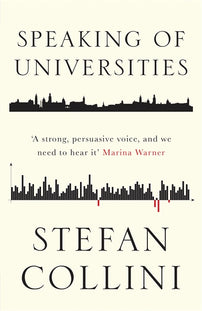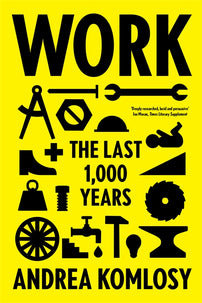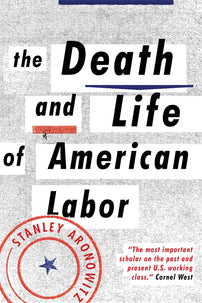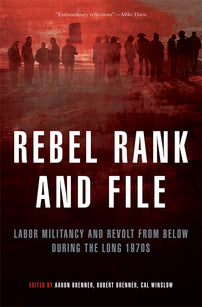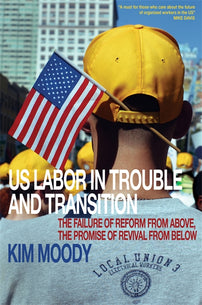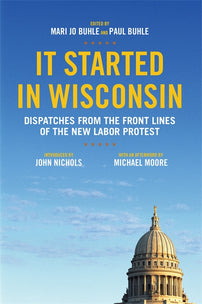"Everybody Who Works Here Should Be Here": The New School Cafeteria Occupation
Interviews with workers and students currently occupying the New School cafeteria.

On May 1st 2018, students led by the Communist Student Group, a New School student’s group linked to the Brooklyn-based Maoist Communist Group, occupied the New School University Center cafeteria. In March, the university administration announced that it was going to end its contract with Chartwells, the corporation that had been administering the cafeteria. The university would resume direct administration of the cafeteria under the management of the hated lead chef Brian Duhart, the subject of numerous complaints by workers who have accused him of favoritism and harassment. Workers received letters that they were being laid off, and that if they wanted to stay they would have to reapply for their old jobs. These positions would be non-union, with lower pay and fewer benefits, and a majority of the workers would be replaced by student workers paid at low wages with no benefits. In response, the workers’ union UNITE HERE! Local 100 circulated a petition opposing the layoffs. The petition received no response from the administration. The CSG began meeting with campus workers and started a very visible propaganda campaign announcing their intention of occupying the cafeteria. On May 1st, students and workers rallied and marched on the cafeteria, announcing their intention to stay until every one of their demands is met. As of May 7th, the University and UNITE HERE Local 100 had reached an agreement to save the cafeteria jobs, maintain union representation, and negotiate a new collective bargaining agreement. As of yet, the occupiers have not recognized the validity of this agreement.
Initial Student and Worker Demands:
1. Every Job Saved
2. Higher Wages
3. Same Benefits
4. Tuition Vouchers
5. Resignation of New School treasurer Steve Stabile
6. Worker-Student control of the cafeteria
For a timeline of events since the start of the occupation, see here.
These interviews were taken inside the occupied cafeteria on May 2nd, the second day of the occupation.
Abad DeGraffe has been a New School Cafeteria worker for about two years. He was formerly in the Marine Corps and has worked in the restaurant industry for decades.
Why are you participating in this action?
Abad DeGraffe: After going 2 years I felt like I wasn't appreciated. Just like the other places I've been to most of my life, almost 40+ years of cooking, they're telling me "up your's buddy, we don't need you.” I'm not being appreciated and there's no job security, that's what I came here for. I'm too old to be putting in applications and sending resumes. My days of doing that are over. The restaurant business is a dirty freaking business. It's a backstabbing business.
Why pursue this kind of militant direct action and not rely on the established channels to protect workers’ rights?
In the Marine Corps we went through the chain of command. But now, at my age, I've realized you've got to take another road or go down another avenue, ‘cause if that's what it's gonna take that's what it's gonna take. The Marines learned to do that especially in combat. If I have to go to avenue A B and C just to get to job security street that's what I'm gonna do. You've got to be alert and aware, you've got to be problem solver.
The normal ways of doing it weren't getting the results?
It wasn't gonna get it all. It was already done and over with, they already told us we are fired. They gave us a letter saying Chartwells is not taking over anymore, and we would have to put in a new application. I knew this was done by the chef, he wanted to get rid of people he couldn't get rid of before.I don't know if I was gonna be one of the ones that was gonna be rehired.
How are students and workers working together?
Brian [Duhart] was a jerk, that I came today in my uniform, and I saw all this around the hallway, I came inside the cafeteria and I saw everybody and I practically had tears in my eyes, and it hit my heart like falling in love for the first time, puppy love. And I said, who's gonna cook me breakfast, and everybody was laughing. After a while, I had to stand up and say what I said. "You guys are my heroes," they say “thank you for your service." That's all fine and dandy, but look what y'all did, "thank you for your service." They are my heroes, they are my angels. I treat them with enough respect as they were the general or the commandant of the marine corps, with total respect, with total admiration. I got a new found love, this is puppy love.
Many of the students organizing this action are communists and socialists, how has it been working with them?
If this is what it took, yeah. I'm at the age where I am too old to be putting in resumes, and putting in applications.
The Student Workers Union SENS-UAW is going to go out on strike soon. Have you heard about this?
No
Do you think there could be similar cooperation between students and workers during that strike?
There should be. All the other workers should be here. Everybody who works here should be here.
How long do you intend to continue this action?
I want the students to be witnesses when we sign that contract, right there in that cafeteria. This is what we are fighting for.
What is the best possible outcome?
Our jobs back, higher wages, management: get rid of it. Have it under us, we can run it, I can run it.
I don't know what kind of a deal we are gonna get. A higher wage but no union. I said “What? A higher wage, I'd love to get a higher wage, but no union?” That means I can't go to the doctor anymore down on 26th St and not worry about the copay and other stuff. C’mon man, my last name ain't Trump, it’s DeGraffe.
What are the next steps?
Let's get back to normal and live like one happy family. And I want the students to be more interactive with us.
Meg Beyer is a student and worker at the New School and has been involved in multiple struggles over labor and education at the New School and more broadly in New York City.
Why are you participating in this action, and how did you get involved?
Meg Beyer: I think when I found out about the changes in cafeteria staffing back in March I was a little bit up in arms about it, but I didn’t find a lot of support in my fellow students or fellow workers. There was a lot of confusion about what was happening, and I think a lot of energy was being put into the graduate student worker unionizing campaign. It didn’t really seem like people had a lot of energy to put it anywhere else. There were some petitions that went around slowly, but they grew not necessarily with graduate students, where things tend to grow with labor, but with the undergraduate and graduate hybrid group. The Communist Student Group (CSG) proved itself pretty effective at getting its message out, flyering like crazy, and made it so that students realized there was energy to provide resistance. That energy encouraged me to take the risk of going forward with more militant action than we could have with less interest or fewer people.
Why pursue this kind of militant direct action and not rely on the established channels to protect workers’ rights?
It was hard enough to figure out who there was to talk to in terms of organized representation of the workers. There seemed to be a lot of division among cafeteria workers themselves in terms of what way to move forward. There hadn’t been a lot of public discussion. As soon as there was, this really positioned itself as the only option. The petition that UNITE-HERE LOCAL 100 put together was effective in making it clear who exactly who this would affect. Undergraduates took it upon themselves to put forward a poster campaign, working alongside the union, rapidly publicizing the issue. The only action apart from the petition was the call for an occupation. What was interesting about this was that there wasn't a lot of debate about how to move forward. It was either do this or do nothing. Especially this close to the end of the semester, because students were about to leave, drastic action needed to be taken. This seemed like the only course of action.
How are students and workers working together?
Workers spent the night with us. They are going to continue to spend the night tonight. Students and workers are working together in a committee, but mostly we are hanging out and chatting all day. Listening to what’s happening between workers and their immediate supervisors and the higher level management in the cafeteria brings out daily struggles that extend beyond keeping their jobs. This place could be run very differently, and the workers are the ones who know how to do it. It seemed abunduntly clear that university management was fully unaware of the workers issues with Chartwells’ management, and the administration decided to rehire management that the workers would rather not be present in the workplace. It seems like it’s adding insult to injury to say that workers won’t be guaranteed to keep their jobs while the bosses everyone hates will. That is one of the things that is really coming out in conversations with workers. This needs to become something more than just keeping a shitty job with a shitty boss, and we want to be here for them for that.
It’s not uncommon for some on the left to discredit any action that takes place on campus. As socialists or communists, we’re supposed to turn to some mythical idea of the working class. And yet, as your occupation should remind them, the working class is on campus, as workers, and sometimes also as students. How are people thinking about this issue here?
This became clear pretty quickly for students. Workers would lose their jobs and be replaced by cheap student labor. Students became workers immediately by the suggestions of the administration. As students we are also workers, future workers, and now potential cafeteria workers. It puts us in the position of the worker to know that their job is gonna be our shitty job with no benefits and lower pay.
Your action comes just before a UAW strike on the New School campus, and comes shortly after another major strike action at Columbia University. In your case here at the New School, what is the relationship of militant workers and students to official unions? How does this action play into the upcoming SENS-UAW strike? Do you think students will take a similar action to support those striking workers?
While a lot of undergraduates are on the front lines of this particular action, graduate students are here too. We have both graduate students and undergraduate in the bargaining unit. On this particular campus it's not a stretch for someone to feel solidarity with someone feeling the wrath or complete disregard of the administration. I think this issue seems more acute to a lot of folks. Retaliation for militant strike action won’t be tolerated by undergraduates. But the strike isn’t as sexy. An action like this can only help bolster campus wide support for the strike. People feel the energy in a room of people in solidarity with workers, and that’s pretty intoxicating. I think something like this, especially if it’s your first action, makes you question a lot of boundaries that you’ve set up mentally, in terms of what’s possible. Just going behind a counter in the kitchen is an important action. It makes things less scary and develops a sense of worker and student control of the environment that we’ve built with our money and our labor.
What is the role of militant students in this action and workplace action as a whole?
I think it’s to build confidence in workers and students that change is possible. I think you see it in action. You saw it when president David Van Zandt showed up. It’s scary to be a more militant student and speak out, but it pushes the hand of the administration. It makes the group less controllable, and less naive.
How long will you continue this action?
Until all demands are met.
What is the best possible outcome?
Complete worker student control of the cafeteria and the downstairs cafe. That quality food is distributed affordably to the community in the New School and the area.
What are the next steps?
We will continue to work with the committees that we’ve built and allow those that are necessary to develop organically. We want to make sure that when students leave this space they know what an occupation is like and that they understand that they’ve taken control of a particular element of the cafeteria’s production, and that they understand what it’s like to organize to sustain a militant action.
Robert Griswold is a member of the Communist Student Group and a current New School student.
Why are you participating in this action? How did you make the decision to get involved?
Robert Griswold: We only made the decision last Sunday and the following Friday we had a mass meeting. Workers and students from all over the school came out, including maintenance workers in solidarity with the cafeteria workers.
Why pursue this kind of militant direct action and not rely on the established channels to protect workers’ rights?
The Communist Student Group are communists who support workers in their struggle against the capitalist class. What is interesting is this is a struggle between the big bourgeoisie and workers. The board of trustees is made up of hedge fund managers, CEOs, and Wall Street bankers. This layoff is just another line on their long resume of exploitation. We chose to organize a committee of workers and students outside of the framework of trade-unionism because we think it is important to build autonomous workers organizations independent of bourgeois institutions like non-profits, bourgeois trade unions, and bourgeois political parties. These autonomous workers organizations are the cells that will come together to form a communist party, which does not exist yet in the US.
How are students and workers working together?
Members of Communist Student Group have spent everyday for the last 9 days coming into the cafeteria, building genuine ties with the workers, trying to subjectively understand the need to transform the situation and organize a militant proletarian response to the the layoffs. This has culminated in the formation of the May Day Struggle Committee which is a joint committee of the communist students and workers.
It’s not uncommon for some on the left to discredit any action that takes place on campus. As socialists or communists, we’re supposed to turn to some mythical idea of the working class. And yet, as your occupation should remind them, the working class is on campus, as workers, and sometimes also as students. What’s the strategic import of campus based struggles? What is the role of militant students in this action and workplace action as a whole?
We see students as the rear detachment of the working class. This is a struggle led by workers and communists. Workers have definitely been playing a very serious role in the leadership. Communists provide leadership over the entire movement. The Communist Student Group has also been issuing joint statements with maintenance workers who support the cafeteria workers in their struggle against the bourgeois administration. We see this as significantly different from most of the student organizing that’s happening in this country, which is totally isolated from the working class.
Your action comes just before a UAW strike on the New School campus and comes shortly after a major strike action taking place at Columbia University. In your case here at the New School, what is the relationship of militant workers and students to official unions?
We will unite with all who can be united with, but when trade unions are actively obstructing the struggle we are not afraid to attack them. We have been working with thm UNITE HERE! Local 100 in some sense. They have said they support us, they have been encouraging workers to come to the occupation and our meetings, but at the same time there have been some polemical exchanges. We have been repeatedly asked by the workers why we are doing so much more for them than the union. The union is incredibly scared of being sued and often puts the interests of the bosses before the workers when it benefits the union labor aristocracy.
What about the Student Workers Union (SENS-UAW)?
We don’t really have a position on them. We work with them to the extent that we can.
How long do you intend to continue this action?
Until every single demand is met.
What is the best possible outcome?
Not only to save every single one of these workers’ jobs, but to construct an organ of worker-student power in the form of the May Day Struggle Committee which can outlive this particular struggle
What do you think are next steps?
Today we are on the defensive, tomorrow we can be on the offensive. We intend to not only save these workers jobs but to advance the revolutionary movement on this campus.
To keep up to date on the ongoing developments at the New School follow:
Twitter: @NewSchoolReds
FB:@occupiedcafeteria @CommunistStudentGroup
Instagram: @occupy_tns
Donate: www.gofundme.com/feed-the-movement
E.S. Grobschmidt is a left wing militant and labor activist. He is currently active in the New York City chapter of the Democratic Socialists of America.
[book-strip index="1" style="display"]
